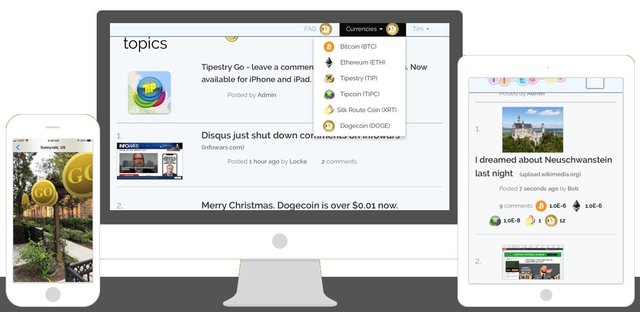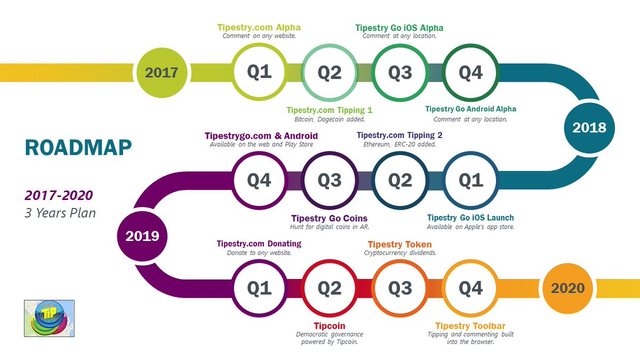Tipestry Comment anywhere

About project
Tipestry adds a meta layer to the Internet allowing users to interact and earn cryptocurrency anywhere online. The main component of the platform is Tipestry.com, a web portal that effectively adds a comment section to any website where people can tip posts and donate to the site being discussed. Tipestry Go is an augmented reality app that lets users leave comments at specific physical locations and search for digital coins hidden throughout the world. A browser add-on that adds more chat and micropayment features is also in development.
There are three related problems we aim to address with this project: first is that the prevailing business model for social media platforms is to sell their users’ personal information to third parties, usually without the users understanding what they are giving up in terms of privacy and security. Second is the difficulty for content creators to benefit financially from their work, which is partially responsible for an overall decline in journalistic standards and the proliferation of clickbait content. Third is the trend for large companies to push agendas – both commercial and political – by censoring or completely disabling user feedback on their sites.
Another goal of this project is to provide new uses for cryptocurrency and to put coins in more people’s hands without requiring an understanding of the technical details. We believe that seamless tipping, in particular, presents a natural introduction to digital currencies and will help spread adoption.

Token Sales
Token sales raised more than $5 billion USD by the end of 2017 and more than $6 billion so far in 2018. One of the benefits of this disruptive new source of fundraising is that it allows entrepreneurs to raise money earlier in the development cycle than would normally be possible through venture capital. Due to its democratic nature, it also makes it possible for concepts that wouldn’t typically attract establishment investors to receive funding. For example, many blockchain projects are run by organizations focused primarily on societal goals rather than profits.
Fundraising, however, is only part of the appeal token sales hold over conventional startup models. There are two additional factors that, in the long run, could potentially have a greater impact. First is the creation of network effects that help entrepreneurs address one of the most difficult problems facing new companies – how to attract users to a platform when the value of that platform depends on the number of users. Token sales answer this question by bootstrapping a user base from the ranks of the token purchasers, who have an incentive to support the platform by acting as early adopters and spreading awareness through word of mouth.
The second advantage is that token sales allow companies a source of revenue that doesn’t require violating the privacy of its users. Increasingly, the business model for Internet companies is to give products away for free and then make a profit by selling their users’ data to advertisers, banks, and government organizations. This model is particularly unfair considering that the users being exploited are the same people creating value for these companies. This is true not only in straightforward cases like social media sites relying on user-generated content, but also on services such as Internet search. The machine learning that search providers utilize to improve their engines is fueled by the information generated by their users, leading some analysists to refer to data as the oil of the digital economy.
Companies with significant user bases, then, face a difficult choice: remain ethical, with little hope of covering their costs and competing with companies willing to sell their users out, or, they can join the growing ranks of data harvesters. The latter choice is particularly attractive considering the compounding effect of data tracking – more users mean more data, and more data means the ability to attract and retain more users.
Token sales offer companies a potential alternative to this temptation by providing a revenue source that doesn’t rely on the violation of their users’ privacy. The transaction is straightforward and clear – token purchasers choose to support companies as they see fit based on their personal values and their belief in the projects. In that sense, selling tokens is the opposite of selling data; transparent instead of opaque, direct rather than involving third parties, and fair instead of predatory.
For all these benefits, however, token sales are not perfect. The advantage of early financing in particular has a drawback – by raising funds early and all at once, there is a problem of incentives compared to traditional models where startups only get money upon the completion of certain milestones. This misalignment of incentives has led to an unfortunate trend of token sales for projects with little or no merit designed solely to extract money from backers. For this reason, it is important when evaluating a project that there’s an actual purpose for the token sale beyond just fundraising. For companies in industries where challenging incumbents is unrealistic due to network effects, the bootstrapping benefit of a token sale is one such reason. Another is that it gives projects that operate in sectors such as social media and Internet search an alternative to harvesting user data. In those cases, token sales offer a unique opportunity for companies to compete ethically.

Tipestry Go
Similar to how Tipestry.com lets people comment on any website, Tipestry Go lets users leave comments at any physical location. Users can leave comments anchored to their current location and see a feed of comments made within an adjustable range. Alternatively, they can change their location by selecting a different spot on the map screen, allowing them to engage in discussion located at areas beyond their current physical location.
By default, posts left at the user’s current location are only visible to friends and posts placed through the map are visible to anyone, although this can be adjusted during post creation. We will also add the ability for users to make posts visible only to specific users on their friends list in the future.
Posts can also be viewed in augmented reality mode. One reason to view posts in AR is that it offers finer level of detail than is possible on the map, allowing users to identify individual comments when the post density is too high even for the maximum zoom level on the map screen. Another is that, once AR glasses become more common, the ability to view posts through Tipestry will become a completely new way to interact with one’s environment.
In addition to cryptocurrency tipping, users can also discover coins hidden throughout the world, both on the map screen and in AR mode. In order to reward users for posting good content, the frequency of coin generation is tied to the popularity of the user’s posts. We will also run Treasure Hunts where users are given clues to discover the location of coins we manually place around the map.
The five main screen in the app are:
- Local – shows a feed of posts within a certain range of the user’s location. The range can be adjusted. The location that serves as the center of the feed can be adjusted on the Map screen.
- Map – shows a visual representation of nearby posts. User can tap on the map to change their location or leave a post at a selected location.
- Friends – shows a feed of posts made by people on the user’s friends list, regardless of location.
- Trending – shows the most popular posts around the world, regardless of location.
- Me – user can adjust their profile details, see a list of their posts, friends, likes, and adjust their settings.
Posts can be tagged by category: Social, Photography, Video, Review, Classified, News, Random, and Other, where a custom category can be manually inputted.
Some of the possible uses include:
- Permanent digital records of notable events. For example, if you record an interesting occurrence, anyone visiting that spot in the future can watch a video of it.
- Leaving virtual notes for specific people instead of physical objects that could be viewed or taken by anyone.
- Share digital information with people in the physical world. For example, post your email address and the person you’re talking to can then see it floating in the air in AR mode so they can save it for later.
- Ticket sales and other local event-driven commerce.
- Meet new people and discover interesting activities while traveling.
- Comment on local businesses, either formally with a review, or more casually e.g. I just had the Chicken Paillard at Cha Cha Cha in Haight Ashbury and it was pretty good.
- Location-based commerce and sharing. For example, you run out of milk and don’t want to go to the store but you don’t know anyone in your apartment building, you could post a microclassified ad offering 100 Dogecoin for some milk.
- Warnings about rattlesnake sightings etc.
To prevent abusive posts and content that local communities don’t want in their area, we plan to use the Tippening to assign moderators to different regions, each with their own sets of rules. There will be various tiers, with national or continent level moderators down to smaller regions such as school campuses or individual neighborhoods.
The goal is to allow different levels of strictness in what is allowed based on the sentiment of the local user base. We plan to experiment with different methods to encourage voting by locals on local rules, possibly through geofencing for certain vote events or perhaps through the creation of additional cryptocurrencies unique to specific areas. For example, someone with an IP address in San Francisco would receive a San Francisco Tipcoin for every normal Tipcoin earned, which would then grant voting rights not only for San Francisco, but also for California and for United States level votes and elections.

Tipcoin and Tipestry Token
We use two tokens to drive the Tipestry ecosystem – Tipcoin (TIPC) and Tipestry Token (TIP). Both were created using Ethereum’s ERC-20 standard. We might replace TIP with an ERC-888 token in the future if that format proves more effective for dividend payments.
Ownership of Tipcoins partially determines voting power for Tipestry content policy and moderation. It will initially be given out as part of an airdrop and bounty campaign and then rewarded over time to active Tipestry users and moderators. We will never sell these tokens for money for two reasons. First is that selling them would effectively mean selling voting power which would run against the objectives of this project. Second is that legally it might make them a security and therefore limit our ability to distribute them in the United States. 1,000,000,000 Tipcoins have been created to reward Tipestry bounty hunters, posters and moderators.
In addition to Tipcoin ownership, voting power will be weighted by the owner’s account status. The status of accounts will be determined by a combination of factors including account age, number of tips and likes received, and certain other undisclosed factors designed to prevent gaming the system. The reason token ownership must be weighted by account status is that otherwise people could simply acquire tokens on the open market and effectively buy unlimited influence over site governance. Preventing tokens from being tradable is an ineffective solution because doing so would eliminate the financial incentive to vote in the interests in the platform - the value of an untradable token, and therefore the health of the platform, wouldn’t matter to the owner.
The Tipestry Token will be sold in our token generation event to help cover the costs of running the platform. It will entitle the owner to a periodic share of Tipestry cryptocurrency revenue, for example fees collected from tipping will occasionally be converted to Ether and then sent to TIP owners. One Tipestry Token will also be redeemable for one month of Tipestry Premium, an upgraded version of a normal Tipestry account. 1,000,000,000 Tipestry Tokens have been created.

Token Sale
Distribution
50% of the Tipestry Tokens will be sold in the token sale. 35% will be kept by the company and 15% sold to early investors and awarded to founders. The token sale will have a soft cap of $1,000,000 USD and a hard cap of $20,000,000 USD.
Use of Proceeds
Tipestry development is already far enough along that we can use proceeds from the token sale primarily for platform growth. The estimated use of proceeds is 35% for marketing, 25% for operations, 25% for further development, 10% for legal, and 5% for developer bonuses.
Contributors to social media platforms ought to share in the profits and governance of the communities they create. It also ought to be possible to use the Internet without sacrificing privacy. Privacy is a basic human right and it’s under threat of extinction if we don’t act now to preserve it.
Tipestry was created with these goals in mind. Through built-in cryptocurrency transactions and proportional voting, users can earn money for their contributions and become part of the platform’s governance. By creating a business model for social media based around cryptocurrency, we can run the platform while respecting people’s privacy.

More information:
WEBSITE: http://www.tipestry.com/
WHITEPAPER: https://tokensale.tipestry.com/Tipestry-White-Paper.pdf
TWITTER: https://twitter.com/tipestry
FACEBOOK: https://www.facebook.com/tipestry
TELEGRAM: https://t.me/tipestry
My bitcointalk profile link: https://bitcointalk.org/index.php?action=profile;u=1705618

Hi! I am a robot. I just upvoted you! I found similar content that readers might be interested in:
https://medium.com/@tipestry/token-sales-are-about-more-than-fundraising-9ca29e8cc23e